The number of Maltese people who plan their lives has decreased each year, with more citizens resorting to live day by day, the State of the Nation Survey showed.
The results of the third edition of the annual survey of the State of the Nation, commissioned by the Office of the President, were presented on Friday at the Verdala Palace by statistician and lecturer at the University of Malta Vincent Marmarà.
This year’s survey will have the advantage of being compared with the results of the previous two years, in 2021 with the effects of the pandemic, and in 2022, just after the general election. The survey focuses on Maltese society, and the beliefs and values which drive Maltese people.
“It’s aim is to understand who the Maltese population is, and what defines it,” Marmarà said.
The study consisted of 1,064 persons from the age of 16 and upwards, to ensure that results are closer to the facts. The margin of error was that of +/- 3%.
While in 2021, 71% of the respondents said that they plan their lives, which has decreased to 50.4% in 2023. At the same time, the percentage of persons who live day by day continued to increase, with 29% in 2021, rising to 49.6% in 2023.
The survey showed that those who pay more taxes on their income are the ones able to plan their lives more.
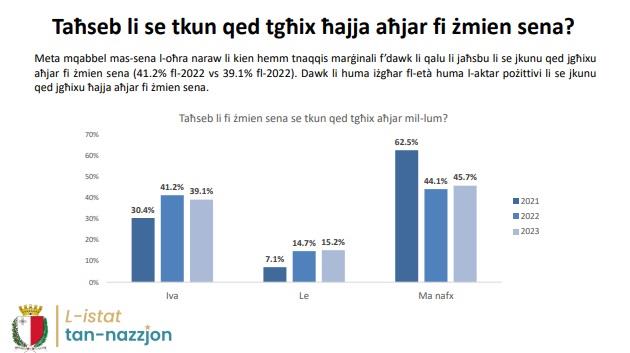
The number of Maltese people remaining loyal to their party is also decreasing, with two thirds of Maltese saying they have always voted for the same party, 15% less than two years ago.
The percentage of people who say they have always voted for the same party dropped from 83% in 2021, to 67% this year.
This year’s survey also found that the number of respondents who would consider switching parties is equal to those who said they will not, both at 39%.
Comparatively, the first edition of the survey showed that only a quarter of the population would have considered voting for a different party in the future, 55% of the population ruling it out.
Younger people were the ones more likely to switch parties, with 54% of the 16 to 25 age group, and 45% of people between the ages of 26 and 35, saying that they have not always voted for the same party.
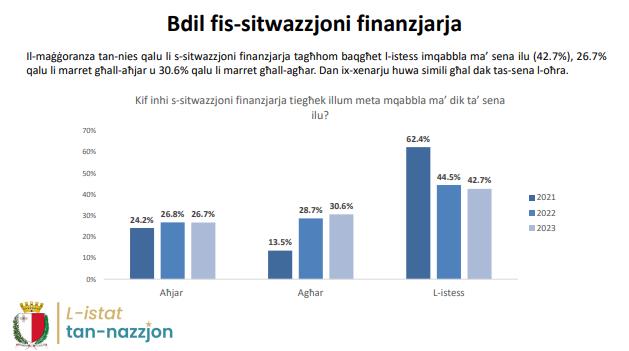
Over three-quarters of people over the age of 56 claim to have always voted for the same party, the survey showed.
One of the reasons playing a role in a switch of votes was income, with almost two-thirds of high earners – the people who fall within the highest income tax band – said that they would consider voting for a different party.
Low-income respondents, also those who are unemployed, are the least likely to switch parties, or to not have always voted for the same party, the survey showed.
78% of Gozitans said that they have always voted for the same party, significantly higher than that compared to the 55% of residents of Malta’s northern and western regions, who said that they never switched parties.
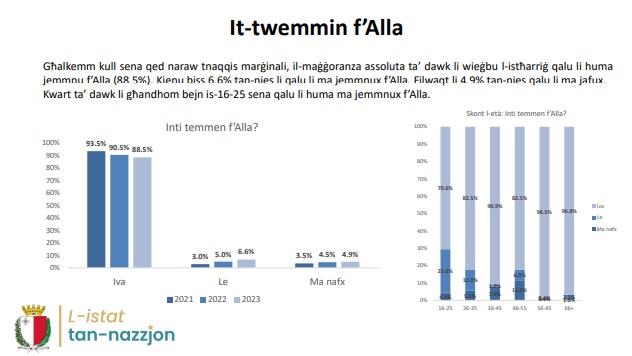
Over a quarter of respondents say that the two main political parties in Malta are the same, with almost half of all respondents between the age of 26 and 35 agree that the two parties are identical.
The percentage of people who say that their preferred political party is aligned with their own ideas had decreased to 79% today, from 90% in 2021.
70% of people who participated say that they plan on voting in the next general election, with 11% saying that they do not intend to cast their vote. One in five respondents were undecided.
Compared to the past years, only 30.6% of people said that they form their opinions on many topics according to the preferred political party opinion. The older the person, the more they form opinions based on the opinion of the political party they believe in.
30.9% of persons said that they have gone to a politician because they needed something.
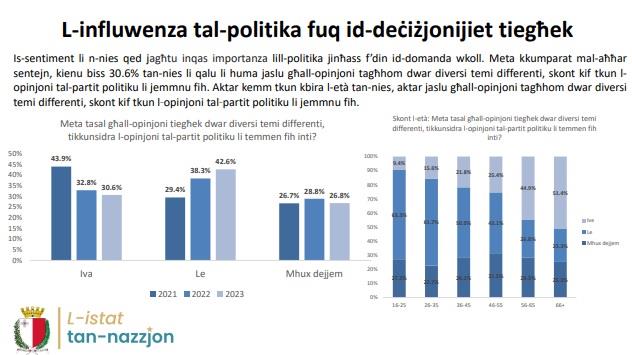
The percentage of people who said that they feel content with their lives has decreased this year, at 66.6%, from 77% in 2022. In 2021, the percentage of people who were happy with their lives was 60.7%.
39.1% of respondents say that they believe that they will be living better in a year’s time, as compared to 41.2% in 2022. Those younger in age are the ones most positive that they will be living a better life in a year, the survey showed.
The 2023 survey registers the lowest ever percentage of people who think that their rights are being seen to, at 58.2%. Last year, in was 67.4%, and in 2021 it was 62.4%
The survey shows that each year, there is a marginal increase in persons who believe that their rights are not being seen to. People who are younger than 26 are the most who feel that their rights are being seen to, at 71.1%

Nearly 43% of the respondents say that their financial situation has remained the same compared to the previous year. 26.7% said that their financial situation has improved, and 30.6% said that it has worsened.
Almost four out of five said that their standard of living compares with the average. The percentage of those who believe that their standard of living is below average has increased, with the effects of inflation clearly showing year by year.
68.8% of Maltese people say that they look to the family they live with to discuss personal problems. 56% say that they do not seek help on their problems from work colleagues, the survey showed.
Family is also the main source for people when taking important decisions, with 75.6% of respondents. 50.9% of respondents say that many important decisions are not discussed with anyone, but rather the person makes their own decision. The results attributed to family importance in Maltese people has remained similar to previous years.
Despite observing marginal decreases yearly, the absolute majority of respondents say that they believe in God (88.5%). Only 6.6% said that they do not believe in God, and 4.9% said that they did not know.
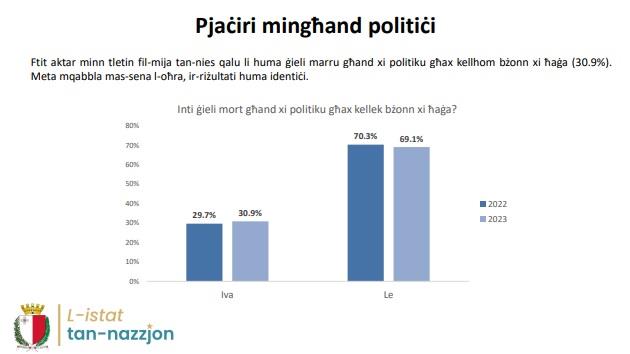
A quarter of those between the ages of 16 and 25 said that they do not believe in God, the survey showed.
61.4% responded that religion is very important in their lives. 26% said that it is not very important in their lives, and 9.7% say that religion is not important at all in their lives. These results are similar over three years.
In 2022, 46.4% said that they heavily consider religion in decisions over right and wrong. This has increased in 2023, with 49% taking religion into consideration in decisions of right and wrong.
29.5% say that that do not consider religion in decisions of right and wrong so much, and 16.2% said that they absolutely do not consider religion in decisions of right and wrong.
Each year, there is an increase of people who say that they feel part of Europe (11.2% in 2021, 20.6% in 2022 and 25.3% in 2023). The survey speculates that this could be due to the war in Ukraine.
Youth between 16 and 25 are the least who attribute themselves as the resident of the town or city they reside in (8.5%). Gozitans are the ones who most attribute themselves as the resident of the town or city they live in, at 35.8%.
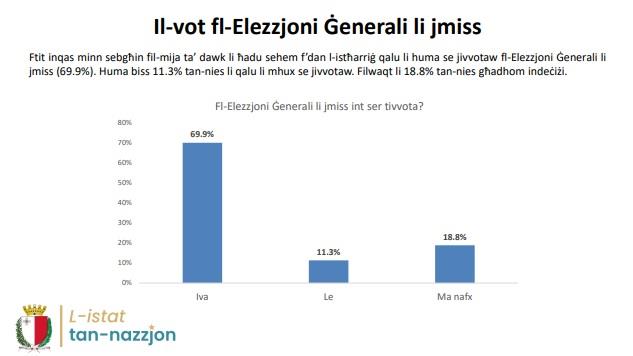
Most Maltese people responded that they did not wish to have been born in another country (74.8%) 18.5% of respondents said that they wished they were born in another country. 6.7% said they did not know.
Compared to results of previous years, there has been an increase in persons who wish they were born somewhere else. Those under 25 are the ones who wish they were born abroad (35%), with only 10.6% of Gozitans who wish they were born elsewhere.
The main language considered as the principal language of Maltese people is Maltese (75.4%). 3.6% of respondents said that English is their primary language. 19.4% of respondents said that they consider both Maltese and English as their primary languages.
46.4% of participants believe that the Maltese media reports and discuss topics which concerns them moderately. (not a lot, but not nothing) The survey showed that 21% of respondents said that the Maltese media does not report or discuss topics concerning them.
21.8% of persons said that the Maltese media reports and discusses many subjects which concern them.
Television, and news portal links on Facebook remain the most sought after means for people to follow news.
The absolute majority (88.5%) of Maltese believe that the events occurring overseas are affecting Malta much more than those which occurred 10 years ago.
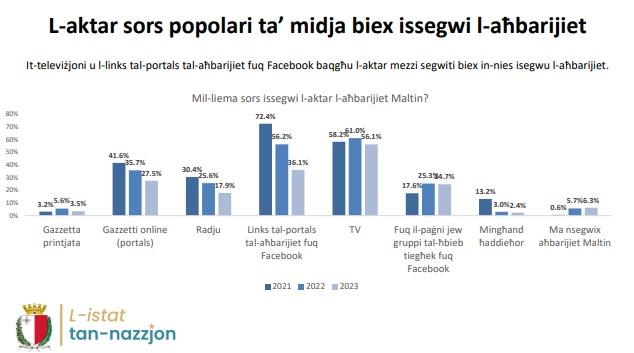
When questioned how ready the person is to trust another fellow Maltese person, (1 being you do not trust anyone, and 5 being trusting everyone), the most common response was “3 – Neutral.” The average was that of 2.86. The survey shows that there is a yearly decrease in the average, meaning that Maltese people are trusting less.
63% of respondents said that the involvement of art and culture is important for the personal development of the individual. Almost 45% of participants said that art and culture are essential for life.
In the question asking people how comfortable they are with the mix of cultures in today’s society, with 1 being not at all comfortable, and 5 being very comfortable, the average was that of 3.05. Youth between 16 and 25 are those who feel most comfortable with the mix of cultures in society.
Almost three-quarters of those who participated said that they prefer communication with family face to face (74.8%)
48.2% say that they communicate mostly with friends face to face, while 34.2% say that they speak with friends mostly through social media and SMS. Only 17.6% of people call their friends.
58.6% of youth between the ages of 26 and 35 communicate with friends through social media and SMS. Men are the ones who prefer speaking with their friends face to face (57.5% of males, compared to 39.6% of women.)
Gozitans are the ones who prefer speaking to their friends face to face the most with 62.8%
76.8% of respondents say that they discuss local events with others face to face.
The absolute majority of the population said that respect and values which build a person are being taught most by the family (85.9%). 14.1% of the persons said that they are taught these from school.
The conclusions of the survey resulted that Maltese people regard feasts as the most important thing of Maltese culture, followed by traditional Maltese food and the Good Friday procession. The population believes in God, but not at the same level of importance it gives to religion.
The survey also showed that youth and the elderly have different views over various aspects and themes.
The population before the election gave more importance to politics, however, after the general election, it feels that politics is less important to them. There also more people who would consider voting for a different party in the future.
The population has the Maltese nation at heart, is comfortable living in Malta, being associated with Malta and identify themselves with what is Maltese. At the same time, the public is also associating itself with Europe, more than in previous years.
A third of the population is not comfortable with the mix of cultures in the country, another third is undecided or depending on which culture, and only another third say that they are comfortable with culture mix.
The survey concluded that if it weren’t for youth who are more open to different cultures, the majority of the population would have opposed the mix of cultures.
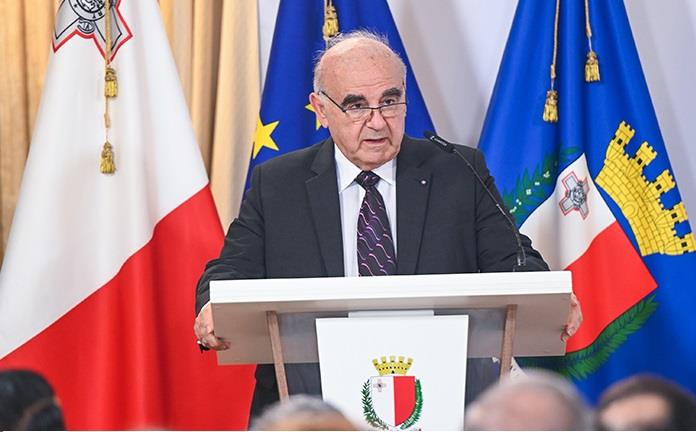
At the opening of the one-day national conference, the President of Malta George Vella remarked that two years ago, this initiative “was a long-term vision and not a one-off occasion that leads nowhere.” He stated that now it is our turn to go one step further and see how we can move to the stage of implementing the recommendations that will be made today. The President explained the importance of politicians, representatives of the authorities, civil society and NGOs starting to look at this Conference from the same perspective.
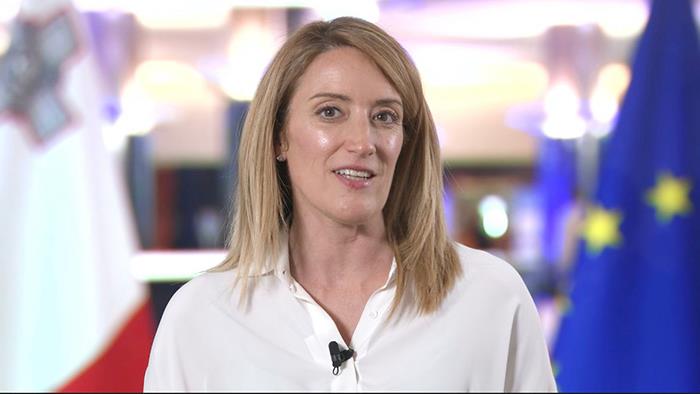
Also addressing the opening of the conference was the President of the European Parliament, Roberta Metsola, whose speech focused on the common good, the need for a new economic model with which every person can live a better life through the wealth created and the need to increase everyone’s activism.
“I deem the common good as a direction, rather than just a destination. A direction offering a strong framework for people to reach their aspirations. Common good does not mean looking at the majorities and forget the minorities or those who are on the edge,” stressed President Metsola. She added that our country needs a new economic policy: a transformation that brings stability and credibility.
“We need a policy that offers hope and a sense of optimism for what we can still achieve,” Metsola said, adding that instead of political rhetoric, people want solutions with which they can have peace of mind.
Full survey here
More to follow